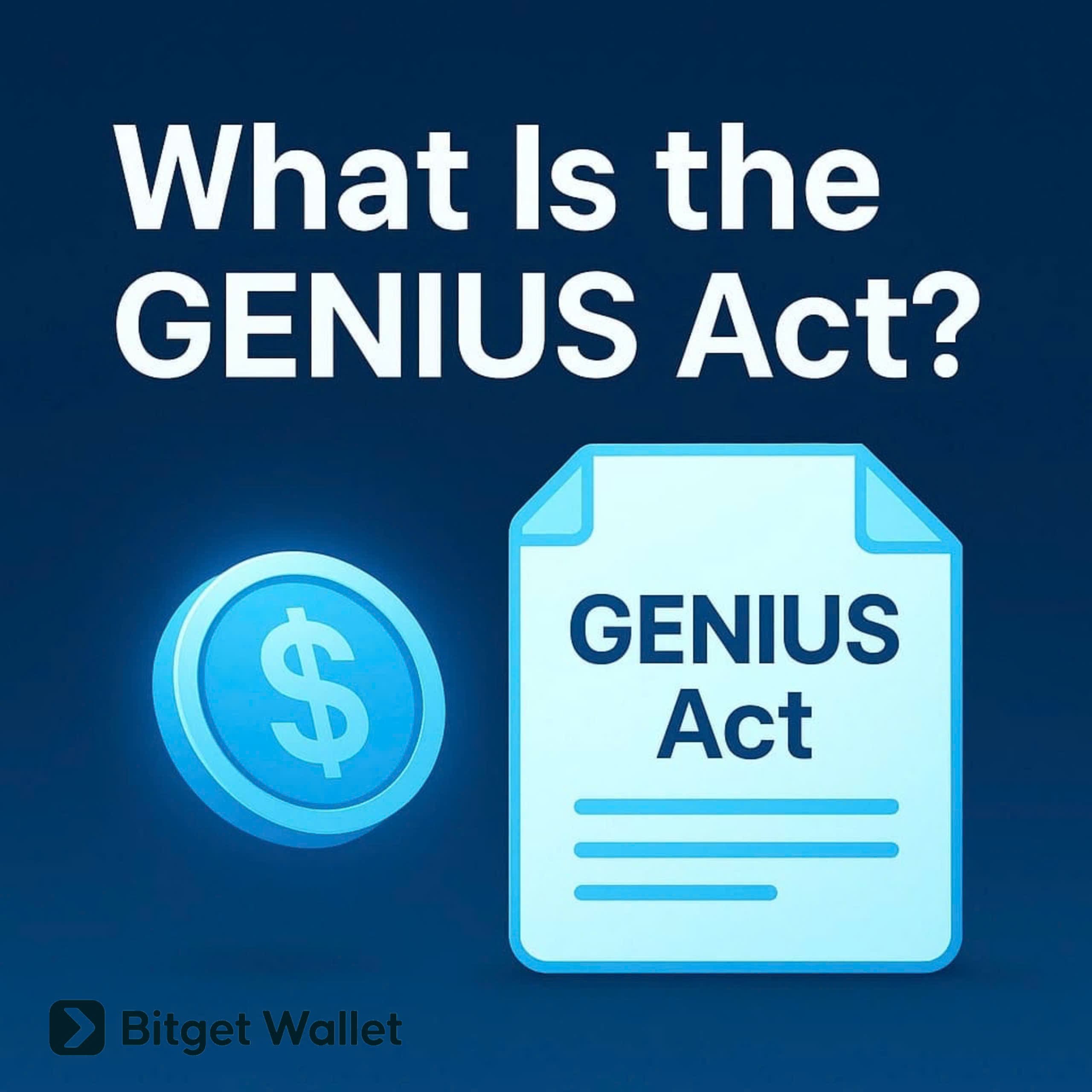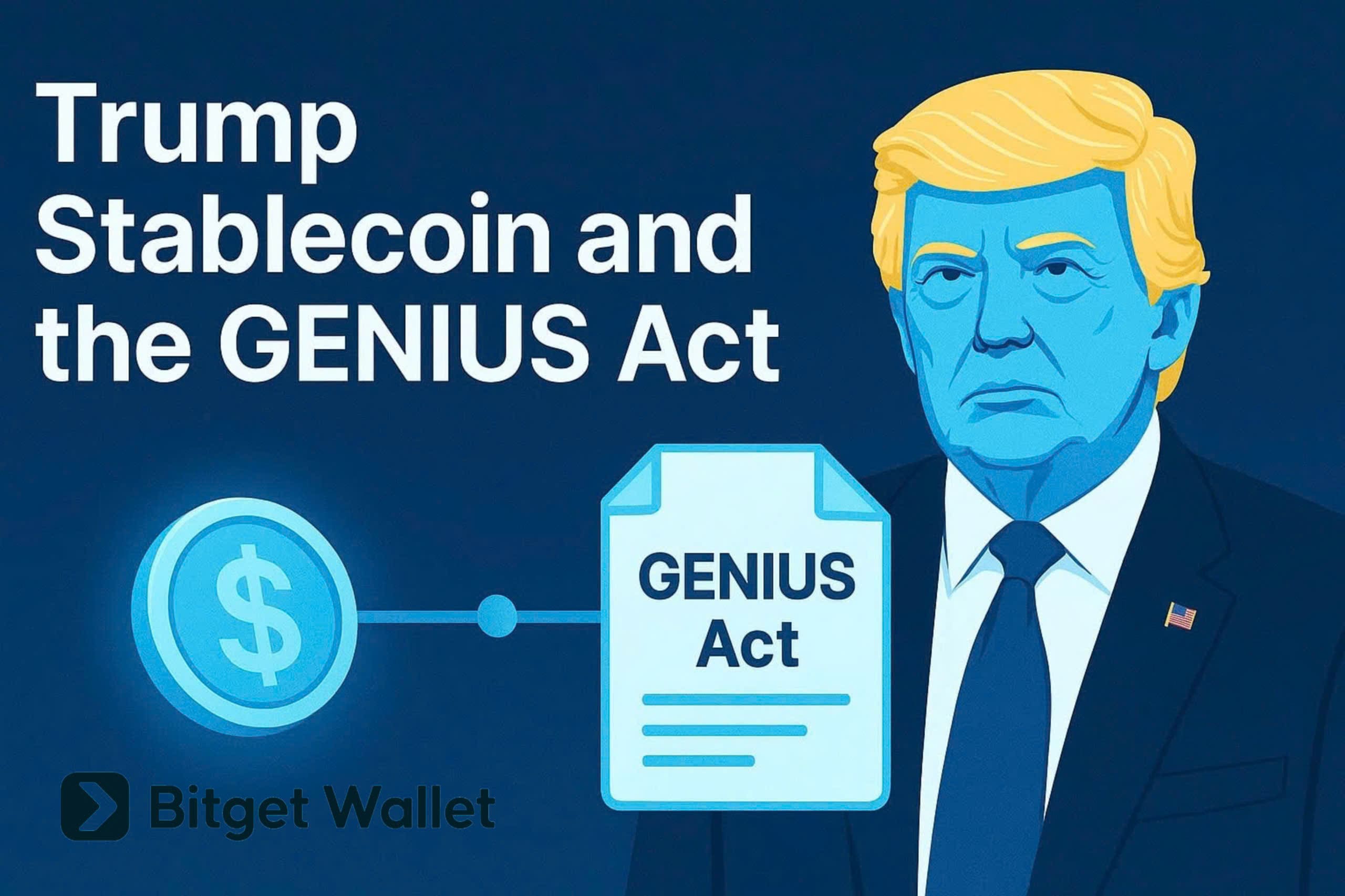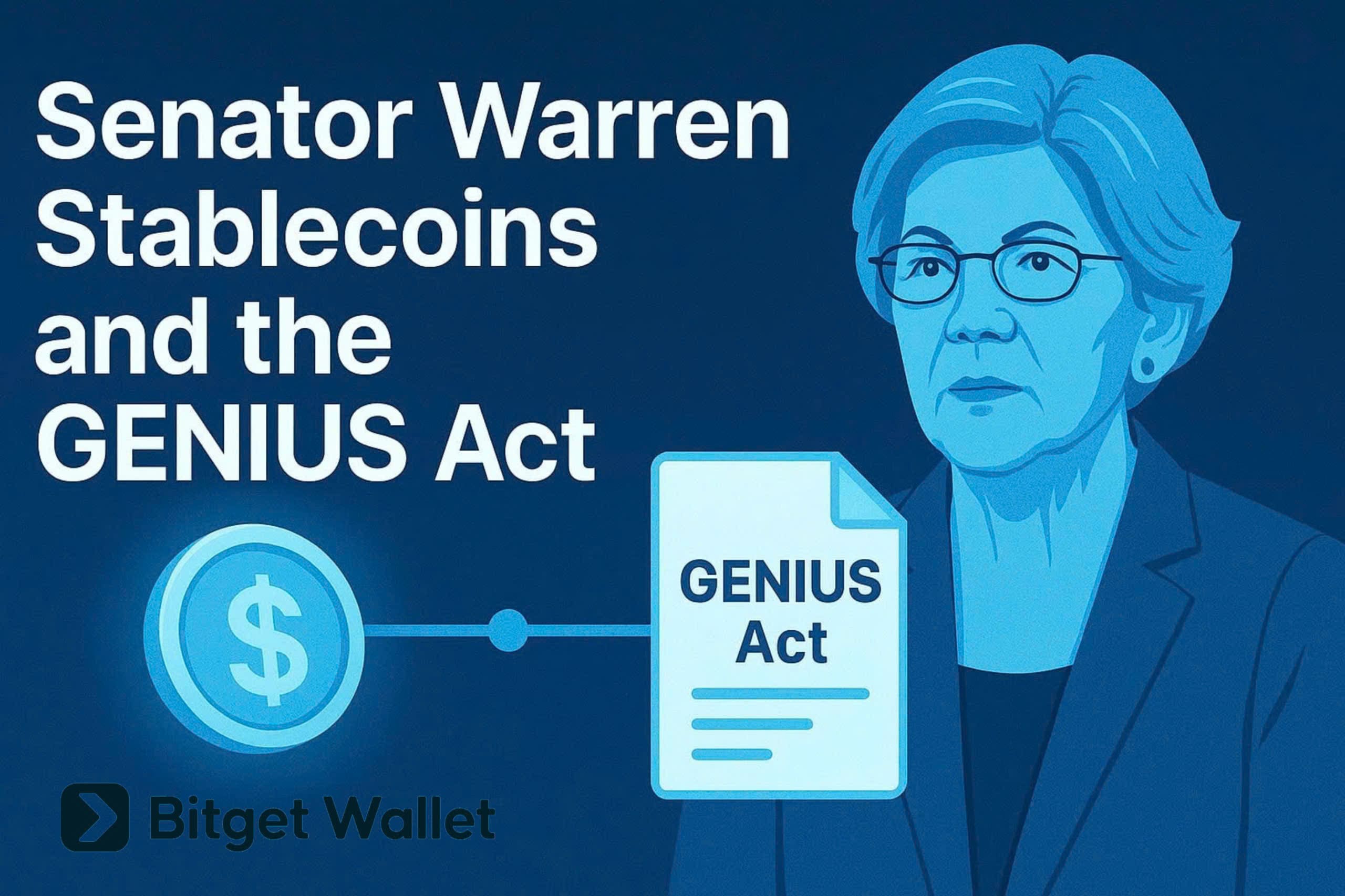What Is the GENIUS Act? U.S. Stablecoin Regulation Explained (2025 Guide)

What is the GENIUS Act? This is a landmark bill passed in the US, establishing the first federal legal framework for stablecoins - a form of cryptocurrency backed by real assets such as the USD. In response to the rapid growth of the crypto market and the post-Trump political controversies surrounding stablecoins, the GENIUS Act was created to fill the regulatory gap, protect users, and promote financial innovation.
As lawmakers tighten their grip on stablecoins and digital assets, the GENIUS Act stands out as a landmark proposal in 2025. In this article, we explore what it is, what it changes—and what it could mean for everyday crypto users.
What Is the GENIUS Act?
The GENIUS Act (full name: Ensuring Fundamental Principles for Transparent and Comprehensive USD Stablecoins Act) is a stablecoin law that the US Senate approved in June 2025 by a vote of 68–30. It is part of a larger US campaign to create a comprehensive crypto law, specifically aimed at regulating stablecoins used for payments - digital assets with stable values, often pegged to the US dollar or gold.
Basically, the GENIUS Act wants to set a common federal standard for stablecoins: ensuring transparency, safe storage, and strong user protection. The good thing is that this law opens the door for "traditional" banks to issue legal stablecoins, helping the US crypto market to compete fairly and have a clear legal framework.
GENIUS Act vs. Other Bills: What Makes It Different?
Unlike earlier legislative efforts that focused broadly on crypto, the GENIUS Act is the first bill to focus solely on payment stablecoins — a rapidly growing category in digital payments.
What sets it apart:
- Bipartisan support: The bill gained backing from both parties, despite concerns surrounding former President Donald Trump’s involvement in stablecoin ventures.
- Stablecoin-specific rules: It mandates 100% reserve backing, transparency of reserve disclosures, prohibits misleading marketing claims, and grants repayment priority to users in the event of issuer bankruptcy.
- Post-Trump political context: After stablecoins like USD1 emerged tied to Trump’s campaign, Congress acted to avoid conflicts of interest and prevent the political misuse of crypto assets.

How Does the GENIUS Act Regulate Stablecoins?
The GENIUS Act not only defines legal parameters for payment stablecoins but also establishes a comprehensive regulatory framework to protect users, increase transparency, and ensure financial stability. The bill focuses on mandatory reserve requirements, periodic disclosures, and strict rules on how stablecoins can be marketed in the U.S.
Stablecoin Reserve Requirements and Monthly Disclosures
At the core of the GENIUS Act is the rule that stablecoins must be backed 100% by real assets — including U.S. dollars, short-term Treasuries, or similarly liquid instruments approved by federal regulators. This is critical for preventing depegging events, which have triggered past market turmoil.
Stablecoin issuers are required to:
- Publicly disclose reserve composition on a monthly basis.
- Undergo annual audits, especially if their market cap exceeds $50 billion.
- Follow liquidity and reserve diversification standards to ensure payout capabilities during sudden mass withdrawals.
Issuer Compliance and Stablecoin Marketing Restrictions
To prevent deceptive promotion, the GENIUS Act enforces strict restrictions on how stablecoins are advertised to consumers.
Specifically, issuers are prohibited from claiming that their stablecoins are:
- Backed by the U.S. government
- FDIC-insured
- Recognized as legal tender
In addition, no digital asset may be marketed as a payment stablecoin unless it fully complies with the GENIUS Act. Violations could result in significant penalties from federal regulators.
These safeguards aim to prevent misleading claims — a major cause of consumer harm during previous crypto collapses.
What Are the Risks and Criticisms of the GENIUS Act?
Although widely praised as a major step forward in U.S. stablecoin regulation, the GENIUS Act has also drawn significant criticism — especially from lawmakers concerned about potential conflicts of interest and its effectiveness in protecting consumers. The two primary points of controversy involve former President Trump’s involvement and doubts over the Act’s enforcement strength.
1. Political Conflict of Interest and the USD1 Stablecoin Debate
One of the most controversial elements of the GENIUS Act revolves around political ties to USD1, a stablecoin reportedly connected to Donald Trump’s presidential campaign.
Despite bipartisan support and industry backing, many lawmakers worry that Trump’s direct involvement in the stablecoin space creates a conflict of interest in crypto regulation. Critics argue that pushing the GENIUS Act while USD1 gains traction could compromise the bill’s original intent and unfairly benefit a single political figure.
2. Concerns Over Consumer Protection and Regulatory Enforcement
Several lawmakers have warned that the GENIUS Act goes too easy on the crypto industry and fails to offer strong protections for users, especially in light of past collapses that wiped out billions in value.
Senator Elizabeth Warren, a leading voice in financial oversight, issued a sharp critique:
“This bill is worse than no law at all — it creates a false sense of security while leaving the door open to very real risks.”
Warren and others argue that such weak stablecoin regulation could fall short of stopping fraud, manipulation, or systemic failures — the same issues that previously harmed countless crypto users.
What Does the GENIUS Act Mean for Crypto Users in 2025?
Despite criticism, the GENIUS Act is still viewed as a necessary foundation for legitimizing stablecoins and integrating them into the mainstream financial system. So what does that mean for users?
More Competition and Consumer Choices
According to Christian Catalini, founder of the MIT Cryptoeconomics Lab, the GENIUS Act paves the way for traditional financial institutions to issue stablecoins, increasing competition and product diversity.
“This bill opens the floodgates. Users will have more options, and issuers will have to compete on product quality and features.”
This shift could accelerate the rise of crypto payments, making stablecoins central to everyday transactions, cross-border remittances, and decentralized finance.
Why Crypto Wallet Compatibility Will Matter
As stablecoin adoption accelerates under new federal regulations like the GENIUS Act, the role of crypto wallets is evolving rapidly. No longer just tools for storing assets, wallets must now support regulatory compliance, enable real-time utility, and offer top-tier security — especially in a landscape where legality and usability converge.
Bitget Wallet is uniquely positioned to meet these next-generation needs. Here's why:
- Multi-chain Support (130+ blockchains): Enables cross-chain stablecoin use, bridging, and DeFi access without friction.
- Stablecoin Compatibility: Fully supports GENIUS-compliant stablecoins like USDC, USDT, and DAI, ready for both payments and DeFi applications.
- Institutional-grade Security: Features MPC (Multi-Party Computation) technology, hardware wallet integration, and anti-phishing protection to safeguard user funds.
- Built-in Swap Aggregator: Lets users swap stablecoins and tokens instantly across chains with the best available rates.
- Real-time Tracking & Portfolio Insights: Offers live price charts, gas tracking, and asset overview — critical for users in regulated environments.
- Seamless dApp Connectivity: One-tap access to Web3 apps, DeFi, and cross-chain tools — without compromising speed or security.
Whether you're paying for a coffee, sending funds across borders, exploring compliant DeFi protocols, or managing tokenized real-world assets — the stablecoin experience in 2025 will demand more than just a wallet. It will require a gateway that’s secure, interoperable, and ready for regulatory scrutiny. In the GENIUS-era digital economy, wallet compatibility and compliance aren’t just features — they’re fundamentals.
“As stablecoin usage increases, secure and flexible wallets become essential.”
Conclusion
The GENIUS Act is a landmark legislation that lays the foundation for a comprehensive federal regulatory framework for stablecoins in the United States. With clear rules on backing reserves, transparent monthly reporting, and clear issuer responsibilities, the act aims to do three things: protect users, restore trust in digital assets, and accelerate the adoption of stablecoins across the financial system. But its impact goes deeper than regulation — it redefines how stablecoins will be used in real-world settings, from everyday transactions to decentralized finance (DeFi).
To enter this new phase, a compliant wallet will be a must-have. And Bitget Wallet is the difference. Supporting over 130 blockchains and major stablecoins like USDC, USDT, this wallet is packed with powerful features: institutional-grade security (thanks to MPC technology), real-time asset tracking, in-wallet swaps, and seamless access to Web3 applications. Are you using your wallet to transfer money across borders or explore DeFi under new regulations? Bitget Wallet helps both casual users and crypto pros confidently enter the GENIUS era.
FAQs
1. What is the GENIUS Act?
The GENIUS Act is a 2025 U.S. bill that creates the first federal regulatory framework for payment stablecoins. It matters because it provides legal clarity, enforces consumer protections, and encourages responsible innovation in the crypto space.
2. Which stablecoins are affected by the GENIUS Act?
The Act applies to all payment stablecoins backed by real-world assets like USD or short-term Treasuries. Popular stablecoins like USDC, USDT, and DAI are expected to align with GENIUS compliance standards to remain competitive.
3. How does this impact crypto wallets?
Wallets must ensure stablecoin compatibility, security, and transparency. Bitget Wallet already supports leading stablecoins and meets the performance needs of a GENIUS-regulated environment.
Risk Disclosure
Please be aware that cryptocurrency trading involves high market risk. Bitget Wallet is not responsible for any trading losses incurred. Always perform your own research and trade responsibly.
- Crypto's Halloween Rally: 5 Best Cryptos to Haunt Before Christmas 20262025-10-24 | 5 mins


















